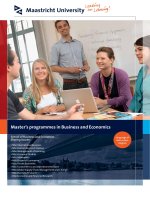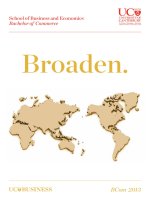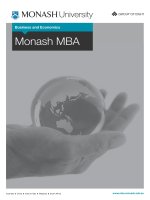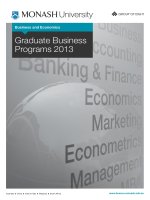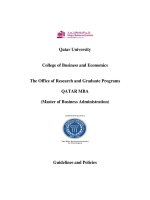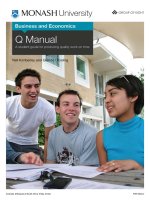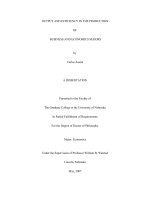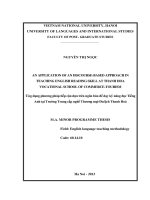School of Business and Economics Bachelor of Commerce: Broaden docx
Bạn đang xem bản rút gọn của tài liệu. Xem và tải ngay bản đầy đủ của tài liệu tại đây (1 MB, 16 trang )
School of Business and Economics
Bachelor of Commerce
Broaden.
BCom 2013
BUSINESS
Contents
3 Business and Economics
at UC
3 Aliations
4 Find your subject
5 Career opportunities
6 Degree structure
7 Major subjects
7 Accounting
7 Taxation and Accounting
8 Economics
8 Finance
9 Human Resource Management
9 Information Systems
10 International Business
10 Management
11 Management Science and
Operations Management
11 Marketing
12 Strategy and Entrepreneurship
13 Courses
15 Additional opportunities
15 Internship Programme
15 Student organisations
Details are correct at November 2012 but may change.
Visit www.canterbury.ac.nz/courses for up-to-date
course information.
www.canterbury.ac.nz 3
Business and Economics at UC
Mission statement
“In the Business of Making a Dierence”
Ko te whakapiki mana tā mātou mahi
Purpose
The purpose of the School of Business and
Economics is:
• To educate graduates in the business skills
and advanced knowledge required to provide
solutions to challenging problems.
• To generate and disseminate advanced
knowledge informed by research and
scholarship.
• To engage with the wider community, both in
Aotearoa New Zealand and internationally; to
make a dierence.
Values
We are proud to be the custodian of Aotearoa
New Zealand’s first Commerce degree
programme and that the learning and research
associated with the programme are grounded in
a long tradition of university scholarship.
We value:
• Academic freedom, intellectual curiosity
and innovation
• Student-centred learning and teaching
• Diversity in the community of scholars
and students
• Integrity and ethical practice.
Features of the BCom at UC
• Flexible three-year degree
• A choice of 11 dierent major subjects
• High employment rates into stimulating,
diverse careers
• World-class teaching and research facilities
• Internationally renowned School with strong
links to business communities
• Opportunities to gain real-world experience
through internships and business
competitions
• Potential to qualify as a chartered
accountant through the NewZealand
Institute of Chartered Accountants (NZICA)
and or Certified Practising Accountants
(CPA) Australia
Business and Economics are
diverse and exciting fields of study
with practical applications to the
world we live and work in.
From financial markets and economics, to the
latest management practices and the rapidly
expanding world of e-commerce, the School of
Business and Economics provides the knowledge
and learning environment to prepare you for a
successful future.
The Bachelor of Commerce (BCom) is a flexible
three-year degree. You can choose from
11 dierent major subjects designed to give
you a competitive edge in the marketplace by
providing expert knowledge and skills.
The BCom subject majors are Accounting,
Economics, Finance, Human Resource
Management, Information Systems,
International Business, Management,
Management Science and Operations
Management, Marketing, Strategy and
Entrepreneurship, and Taxation and Accounting.
The flexible nature of our BCom allows you
to include courses from other degrees. Many
students complete either a double major
(combining two areas of study into one degree)
or a second degree.
A further option students should consider is
postgraduate study. A Bachelor of Commerce
with Honours provides graduates with a valuable
distinction in the marketplace.
The School of Business and Economics
Internship Programme gives business students
the opportunity to undertake real-life projects
for New Zealand companies. Interns gain
industry experience and receive credit towards
their degree.
The School of Business and Economics has a
strong international reputation and graduates
enjoy high rates of employment both in
NewZealand and abroad. Our lecturers have
international standing in their fields and they
have written many of the course
textbooks. This means you learn first-hand
from experts. Business and Economics students
also have access to top international expertise
through the Erskine and other academic
exchange programmes.
The School of Business and Economics' facilities
include computer laboratories, lecture rooms
and tutorial spaces and the world-class NZ
Experimental Economics Lab (NZEEL).
www.nzica.com
www.cpaaustralia.com.au
www.mbaworld.com
www.aapbs.org
Aliations
Contents
4 Bachelor of Commerce
Find your subject
Recommended background
To enrol in a Bachelor of Commerce at UC you have to fulfil University Entrance requirements. For more information go to
www.canterbury.ac.nz/liaison
No prior business and economics knowledge or experience is required or assumed for those beginning a BCom. However, good
English language skills and basic statistical/mathematical skills are very important. If you are unsure about what subjects you
would like to study as part of your BCom, explore the diagram below and take a look at the career opportunities on the next page.
Competence in English expression is essential to the
study of all Business and Economics subjects.
Your ability to communicate clearly can be improved
by studying essay-based subjects like history, classical
studies, art history, geography and English at school.
Start here
Can you clearly express
your ideas in English both
orally and in writing?
Are you studying both
NCEA Level 3 mathematics
with calculus and
statistics and modelling?
If you like to observe,
investigate, analyse, evaluate
and solve problems, and
you are often interested in
activities related to science
and mathematics, then one of
the subjects below may be the
perfect fi t for you.
Can you solve mathematics problems?
Mathematics may not be your favourite
subject, but with some e ort you can
generally complete most problems.
Do you enjoy
mathematics?
Are you studying
NCEA Level 3
mathematics
with calculus?
Are you
studying
NCEA Level 3
statistics and
modelling?
All Business and Economics subjects can be
started at 100-level without prior study of
statistics/mathematics. However, depending
on the subject you will need to apply some or
a lot of statistical/mathematical techniques.
This means that in order to complete a BCom
you will need to take at least one university
Statistics or Mathematics course.
Do you like to
work on activities
that require
numerical ability,
attention to detail,
accuracy and
organisation?
Would you
like to include
foreign language
study and an
international
exchange in your
degree?
Do you like to
work with people,
infl uencing,
persuading,
leading
or managing
them?
Can’t fi nd what you are looking for?
This is just one tool to help you explore
your options. Read more about the di erent
Business and Economics subjects over the
following pages.
•Economics
•Finance
•InformationSystems
•ManagementScience
•Accounting
•OperationsManagement
•InternationalBusiness
•HumanResourceManagement
•Management
•Marketing
•StrategyandEntrepreneurship
YES
NO
NO
YES
NO
YES
NO
NO
NO NO
YES
NO
YES
YES YES
YES
YES
NO
Explore your options
www.canterbury.ac.nz 5
Career opportunities
Subject Career opportunities
Accounting
Graduates may become senior financial executives in business and industry. Many graduates go on to gain a professional
accountancy qualification specialising in tax, financial, management, investment, business services, company or
treasury systems accounting. It is also possible to become an accounting manager, auditor, consultant or credit analyst.
Accountants advance to the highest levels in organisations becoming chief financial officers (CFOs), chief executive
officers (CEOs) and board members.
Economics
Economists conduct research and consult in various organisations including government departments like Treasury
and Foreign Affairs and Trade, state-owned enterprises, the Reserve Bank, trading and merchant banks, stockbroking,
insurance, trade commissions, town and regional planning authorities, market research and other consultancies,
research institutes, business enterprises and education institutions.
Finance
Today it would be rare for a person to rise to the position of chief financial officer (CFO) without a strong grounding
in both accounting and finance. There are also many other career opportunities, with typical jobs including financial
analyst, money market and foreign exchange dealer, loan analyst, equity analyst, portfolio manager, financial planner,
investment banker and small-business manager.
Human Resource
Management
Graduates are found in every kind of organisation. They work as recruitment consultants, human resources advisors/
managers, employment relations managers and employment analysts in business, government departments, state-
owned enterprises, consultancies, banking, insurance, health, education and in recruitment organisations.
Information Systems
As most organisations use information technology (IT) in significant ways, there are many challenging careers in
information systems (IS) both in NewZealand and overseas. Possible jobs include systems analyst, IT consultant, IT
project leader, network manager, database administrator, business analyst, PC support, IS planner, IS manager, IT sales,
business intelligence consultant and webmaster.
International Business
Typical jobs include import/export agent, foreign currency investment advisor, foreign sales representative and
international management consultant. Frequent employers include government departments, banks, import/export
corporations, multinational manufacturers, consulting firms, international non-governmental organisations, electronics
and transportation companies, and tourism and hospitality organisations.
Management
Management graduates are found in every kind of organisation. They start their careers in a wide range of trainee
management, marketing or market research roles and advance into positions as business consultants, strategic business
analysts and senior managers in the commercial, public and not-for-profit sectors.
Management Science and
Operations Management
Every organisation, whether a company or a not-for-profit organisation, has some operations function to it, so the skills
learnt in the area of Management Science and Operations Management are widely applicable. Graduates are usually
employed by manufacturing companies, management consultancies, transport companies, telecommunications
service providers, the energy sector and state-owned enterprises and many rise to senior management levels. Possible
jobs include operations analyst/consultant/manager, business process engineer, production manager, supply chain
consultant/manager, quality manager and change manager.
Marketing
Opportunities include employment as a marketing manager or director, product manager, sales executive, market
research executive, managing director or advertising executive. Graduates work in consultancies, banking, insurance,
health, education, local and central government, state-owned enterprises, business, marketing, tourism and public
relations organisations.
Strategy and
Entrepreneurship
Graduates start their careers in a wide range of trainee management, marketing or market research roles and advance
into positions as business consultants, strategic business analysts and senior managers in the commercial, public and
not-for-profit sectors.
Taxation and Accounting
Graduates may work as accountants in chartered accounting firms, accountancy practices, government organisations,
business and commercial enterprises, non-profit organisations, banking and financial services, management
consultancies, education organisations and law firms. Financial accountant or taxation advisor are possible roles.
6 Bachelor of Commerce
Degree structure
The Bachelor of Commerce is a
flexible three-year degree.
The degree requires a minimum total of
360 points.
• At least 255 points must be from Commerce
courses (up to 60 points of Mathematics
and/or Statistics at 100 or 200-level may be
included in the 255 points).
• The remaining 105 points can be from
Commerce courses or courses from
other degrees.
• At least 225 points must be from courses
above 100-level, with at least 90 points at
300-level.
A minimum of 105 points needs to be completed
in your first year to finish your BCom within
three years. Most students will take 120 points
in their first year.
You must also satisfy the requirements for one
of the 11 BCom majors outlined on pages 7–12.
All UC courses have a point value of 15 or a
multiple thereof.
Core courses
All BCom students must complete five
compulsory 100-level courses (a total of
75 points) selected from six 'core' courses.
BCom majors include the core courses in their
prescibed pathways. The core courses are:
• ACCT 102 Accounting and Financial
Information
• INFO 123 Information Systems and
Technology
• Either ECON 104 Introduction to
Microeconomics or
ECON 105 Introduction to Macroeconomics
• MGMT 100 Fundamentals of Management
• STAT 101 Statistics 1.
For more information on these courses see
pages 13–14.
It is desirable to complete the core courses in
your first year of study as they are prerequisites
(required courses) for 200 and 300-level
Commerce courses. However, it is possible to
complete some of these courses in your second
and third years depending on the requirements
of your BCom major.
Double degrees
Many students study for a second degree in
addition to a BCom. In particular, a BCom and
a Bachelor of Laws (LLB) is a highly marketable
combination. The BCom also combines well with
degrees in Arts, Science, Forestry Science and
Engineering. It is normally possible to complete
the two degrees in five years (some degree
combinations may take longer).
Postgraduate study
If you are thinking of undertaking a double
degree you should also consider postgraduate
study. In the time it takes to finish a double
degree (five years) you can complete a Master
of Commerce. Alternatively, in four years you
can complete a Bachelor of Commerce
with Honours.
Both the BCom(Hons) and MCom are
postgraduate qualifications and represent a
higher level of achievement than a bachelor’s
degree. In an increasingly competitive job
marketplace these qualifications help you to
distinguish yourself.
Students considering a double degree or a
postgraduate qualification should seek advice
from a School of Business and Economics
Student Advisor (see contact details in box).
Where can I go for further advice?
School of Business and Economics student
advisors can assist you in a variety of ways
from planning your degree, to helping with
special applications regarding your course
of study. For enquiries regarding these areas
please contact us.
To book an appointment
Email:
Telephone: +64 3 364 2316
www.bsec.canterbury.ac.nz
www.canterbury.ac.nz 7
Accounting
Accounting covers both financial and
management accounting, and the legal
environment of business, providing a solid
foundation for a successful career.
Financial accounting is concerned with the
collection, recording, summary, analysis and
communication of financial information. The
primary concern of financial accounting is to
provide information for people and groups who
are external to an organisation.
Management accounting, on the other hand,
provides information for managers within
an organisation. This information is used to
aid them with various strategic and tactical
decisions, such as determining the cost of
providing products and services, budgeting, and
estimating the cost structure of competitors.
Many accounting students aspire to become
chartered accountants through either the
New Zealand Institute of Chartered Accountants
(NZICA) or Certified Practising Accountants (CPA)
Australia. For both NZICA and/or CPA (Australia)
memberships your BCom must include specific
courses.
Taxation and Accounting
The New Zealand Institute of Chartered
Accountants (NZICA) and Certified Practising
Accountants (CPA) Australia recognise the
importance of studies in taxation, with courses
containing taxation content included in the
'core' and 'accounting and/or business related'
courses. This subject area is necessary for people
who wish to become a chartered accountant. In
addition, it is an area of specialisation in its own
right within the accounting profession.
Contact
Department of Accounting and
InformationSystems
Telephone: +64 3 364 2613
Email:
www.acis.canterbury.ac.nz
Major subjects
Courses from Commerce
or other degrees
Commerce major – required courses
Other Commerce courses
Year 3
Bachelor of Commerce majoring in Accounting – typical degree structure
Year 2
Year 1
200
Level
200
Level
200
Level
100
Level
1
MSCI 110 can be taken instead of STAT 101, but it is not recommended as it constrains later options.
Each small block represents a 15-point course. However, some courses may be 30 points (or more).
200
Level
300
Level
ACCT
300 Level
ACCT
300 Level
ACCT
300 Level
ACCT
300 Level
300
Level
200
Level
200
Level
200
Level
ACCT
211
ACCT
222
STAT
101
1
100
Level
100
Level
ACCT
102
ACCT
103
ECON 104
or 105 or 199
INFO
123
MGMT
100
Courses from Commerce
or other degrees
Commerce major – required courses
Other Commerce courses
Year 3
Bachelor of Commerce majoring in Taxation and Accounting – typical degree structure
Year 2
Year 1
200
Level
200
Level
200
Level
100
Level
1
ACCT 152 is a 15-point course and LAWS 101 is a 30-point course.
EEach small block represents a 15-point course. However, some courses may be 30 points (or more).
300
Level
300
Level
ACCT
300 Level
ACCT
300 Level
ACCT
358
ACCT
359
200
Level
200
Level
200
Level
200
Level
ACCT 211
or 222
ACCT
254
MGMT
100
STAT
101
100
Level
ACCT
102
ACCT
103
ACCT 152
or LAWS 101
1
ECON 104
or 105 or 199
INFO
123
Shefali Iyer
Bachelor of Commerce with
Honours in Accountancy, Finance and
Information Systems
‘The education at UC is
very flexible and practical,
and I think this has helped
me to fit into the real world
of accounting.’
8 Bachelor of Commerce
Economics
Economics is the study of how societies allocate
scarce resources among competing users. It is
about the choices made by people, individually
and collectively, in the production, exchange,
distribution and consumption of goods and
services.
Economics is a behavioural science. As Alfred
Marshall put it in 1890 “Economics is a study
of mankind in the ordinary business of life;
it examines that part of individual and social
action which is most closely connected with
the attainment and with the use of the material
requisites of wellbeing.” Central to economic
analysis is the study of how people respond
to incentives in a market economy, how these
incentives may be modified by government
intervention, and whether and how government
intervention is warranted.
Economics streams
At UC emphasis is placed on three core areas
of study.
Microeconomics
Microeconomics examines the behaviour and
decisions of individuals, households and firms,
and their interactions in everyday life. Much of
the analysis involves markets where buyers and
sellers come together to exchange. How market
outcomes and interventions in those markets
aect economic welfare are important topics.
Markets which are regulated by government,
have only a few participants or are characterised
by dierent amounts of information, are also
examined.
Macroeconomics
Macroeconomics examines the performance of
an economy as a whole, and provides insights
into the reasons for fluctuations and trends
in national income, unemployment, inflation,
interest rates and exchange rates. It also involves
the examination of governments' taxation,
expenditure, monetary and exchange rate
policies.
Econometrics
Econometrics brings economic theories to data.
It is the study of methods aimed at testing
economic theories and providing quantitative
information on economic relationships for
policy analyses and decisions. Courses provide
an account of econometric methods and
illustrations of these methods, with applications
to real data sets in laboratory classes that
introduce the latest developments in computing
and web technology.
Finance
Finance is a relatively new and rapidly growing
discipline that examines the acquisition and
allocation of financial resources. Where financial
accounting measures past performance, Finance
is forward-focused. It is largely about future
planning for firms or investors.
Finance consists of three interrelated subject
areas which are concerned with the assessment
of the trade-o between risk and reward.
Corporate Finance
Corporate Finance studies how firms raise and
eciently utilise funds obtained from lenders
and shareholders.
Financial Markets and Institutions
Financial Markets and Institutions explores how
the financial system facilitates the transfer of
funds from savers and lenders to borrowers.
Investment Analysis
Investment Analysis studies how investors
choose securities and asset classes for their
investment portfolios.
Contact
Department of Economics and Finance
Telephone: +64 3 364 2631
Email:
www.econ.canterbury.ac.nz
Courses from Commerce
or other degrees
Commerce major – required courses
Other Commerce courses
Year 3
Bachelor of Commerce majoring in Finance – typical degree structure
Year 2
Year 1
200
Level
200
Level
200
Level
100
Level
1
MATH 199 is a 30-point STAR course equivalent to (MATH 102 and MATH 103).
Each small block represents a 15-point course. However, some courses may be 30 points (or more).
200
Level
300
Level
FINC
300 Level
FINC
300 Level
FINC 301
or 311 or 312
FINC 301
or 311 or 312
300
Level
200
Level
200
Level
200
Level
FINC
201
FINC
203
STAT
101
100
Level
100
Level
ACCT
102
ECON 104
or 105 or 199
INFO
123
MATH 101
or 102 or 199
1
MGMT
100
Courses from Commerce
or other degrees
Commerce major – required courses
Other Commerce courses
Year 3
Bachelor of Commerce majoring in Economics – typical degree structure
Year 2
Year 1
200
Level
200
Level
200
Level
200
Level
1
Any Commerce course can be taken instead of MATH 102, but it is not recommended as it constrains later options. MATH 102
is required for entry to honours in Economics. MATH 199 is a 30-point STAR course equivalent to (MATH 102 and MATH 103).
2
MSCI 110 can be taken instead of STAT 101, but it is not recommended as it constrains later options.
3
If ECON 206 is not taken in Year 2, students are required to take ECON 325 in Year 3.
Each small block represents a 15-point course. However, some courses may be 30 points (or more).
200
Level
300
Level
ECON
300 Level
ECON
300 Level
ECON
300 Level
ECON
300 Level
300
Level
200
Level
ECON 203,
208
or 213
INFO
123
ECON
206
3
ECON 202
or 207
STAT
101
2
100
Level
100
Level
ACCT
102
ECON 104
or 199
ECON
105
MATH 102
or 199
1
MGMT
100
www.canterbury.ac.nz 9
Human Resource
Management
If you enjoy the social sciences and want to
explore practical outlets for your interest, then
Human Resource Management may well be the
major for you. Human Resource Management
begins with the assumption that people are
the central resource in any business. A second
assumption is that organisational survival
depends on the extent to which people's skills
and abilities are eectively used. Human
Resource Management is thus concerned with
the issues of creating and sustaining cultures of
learning and performance in organisations.
Human Resource Management includes topics
such as such as leadership, organisational
behaviour, managing change, human resource
management and employment relations,
communication and team dynamics, and career
management.
Contact
Department of Management
Telephone: +64 3 364 2606
Email:
www.mang.canterbury.ac.nz
Information Systems
Welcome to the 'Information Age' where
information systems (IS) are a major part of
many organisations and impact our lives on a
day-to-day basis. IS is the point where business
studies and computer science meet and it deals
with:
• development, support and delivery of
information, information systems, and
information technology
• eective use of information technology to
help individuals, organisations and society
better attain their goals, and
• management of information systems,
personnel and projects.
Information Systems draws together computer
science, management science, accounting,
business administration and organisational
behaviour.
Contact
Department of Accounting and
InformationSystems
Telephone: +64 3 364 2613
Email:
www.acis.canterbury.ac.nz
Courses from Commerce
or other degrees
Commerce major – required courses
Other Commerce courses
Year 3
Bachelor of Commerce majoring in Human Resource Management
– typical degree structure
Year 2
Year 1
200
Level
200
Level
200
Level
100
Level
1
Select 30 points from MGMT 304, MGMT 330, MGMT 333, MGMT 339. MGMT 339 is a limited entry course.
Each small block represents a 15-point course. However, some courses may be 30 points (or more).
MGMT
300 Level
1
MGMT
300 Level
1
MGMT
308
MGMT
331
MGMT
301
MGMT
303
200
Level
200
Level
MGMT
208
or 209
MGMT
230
MGMT
206
MGMT
207
100
Level
100
Level
100
Level
ACCT
102
ECON 104
or 105 or 199
INFO
123
MGMT
100
STAT
101
Courses from Commerce
or other degrees
Commerce major – required courses
Other Commerce courses
Year 3
Bachelor of Commerce majoring in Information Systems – typical degree structure
Year 2
Year 1
200
Level
INFO or COSC
200 Level
200
Level
100
Level
1
COSC 121 or COSC 122 can be taken instead of INFO 125.
Each small block represents a 15-point course. However, some courses may be 30 points (or more).
300
Level
300
Level
INFO
300 Level
INFO
300 Level
INFO
300 Level or
COSC 362
INFO
300 Level
200
Level
200
Level
INFO
203
STAT
101
100
Level
100
Level
ACCT
102
ECON 104
or 105 or 199
INFO
123
INFO
125
1
MGMT
100
INFO
233
Shonam Ram
Bachelor of Commerce with endorsements
in Human Resource Development and
Strategic Management
‘Every day, in every
lecture, I got to learn
something new.’
10 Bachelor of Commerce
International Business
NewZealand organisations are increasingly
involved in globalisation and need well-prepared
graduates able to operate with confidence in the
international business environment.
This major provides the opportunity to gain
skills relevant for conducting business in a
global, multicultural economy. You will study
activities and transactions that involve: the
crossing of borders both from the viewpoint of
a firm and the individual; decision making and
management in cross-cultural settings; how
firms can configure their activities to achieve
their owners' objectives in an evolving operating
environment; the strategic and cross-cultural
aspects involved in international marketing; and
from the viewpoint of a country, the reasons
for and the welfare eects of international
trade and trade policies such as taris and
export subsidies.
You will also study a foreign language and/
or culture. International Business students are
encouraged to spend a semester studying at
an overseas partner university. This provides
a great opportunity to learn about a dierent
culture, gain insight into dierent business
environments and practices, and form
new contacts.
Contact
Dr Laura Meriluoto
International Business Director
Telephone: +64 3 364 2767
Email:
Management
Management covers marketing, organisational
leadership and development (including human
resource management), strategic management
and international business. It aims to increase
the understanding of the factors that influence
the conduct of organisations and to provide
students with tools and techniques, which they
may use to influence organisational life.
UC oers industry-relevant projects and inter-
active classes that cover a broad area of study.
Management courses draw on other disciplines
including Psychology, Media and Communica-
tion, Sociology, Economics and Statistics. The
ideas and practices from these disciplines are
applied to the understanding and management
of commercial and public sector organisations.
Contact
Department of Management
Telephone: +64 3 364 2606
Email:
www.mang.canterbury.ac.nz
Courses from Commerce
or other degrees
Commerce major –
required courses
Required language
courses
Year 3
Bachelor of Commerce majoring in International Business – typical degree structure
Year 2
Year 1
MKTG
204
4
200
Level
4
100
Level
4
1
Select 15 points from MATH 101, MATH 102, MKTG 100. MATH 199 is a 30-point STAR course equivalent to (MATH 102 and MATH 103).
2
Select 30 points in a single subject from French, Chinese, Spanish, Japanese, German or Russian courses.
3
Select 15 points from FINC 201, MKTG 201.
4
For the International Exchange pathway, 60 points at 100 and 200-levels is completed at a partner university. These points
must include a course equivalent to MKTG 204 or, alternatively, MKTG 204 can be done in summer semester in the beginning of
second or third year of study.
5
Select 30 points from FINC 301, MGMT 324, MKTG 301, MKTG 314.
Each small block represents a 15-point course. However, some courses may be 30 points (or more).
MGMT
332
FINC, MGMT
or MKTG
300 Level
5
MGMT
320
FINC, MGMT
or MKTG
300 Level
5
200
Level
200
Level
FINC
203
MGMT
221
ECON
222
FINC or
MKTG
200 Level
3
INFO
123
100 Level
Language
2
100 Level
Language
2
ACCT
102
ECON 104
or 199
MATH or
MKTG
100 Level
1
MGMT
100
STAT
101
Courses studied on
International Exchange
FINC
344
200
Level
4
Courses from Commerce or other degreesCommerce major – required courses
Year 3
Bachelor of Commerce majoring in Management – typical degree structure
Year 2
Year 1
200
Level
1
200
Level
1
200
Level
100
Level
1
Select 30 points from ACCT 222, MGMT 208, MGMT 209, MGMT 221, MGMT 230, MGMT 280, MKTG 202. Students intending to
complete a BCom(Hons) or MCom degree must pass MGMT 280.
2
Select 30 points from MGMT, MKTG, MSCI.
Each small block represents a 15-point course. However, some courses may be 30 points (or more).
300
Level
2
300
Level
2
MGMT
320
MGMT
301
MGMT
308
200
Level
200
Level
MGMT
206
MGMT
207
MGMT
270
MKTG
201
MSCI
101
STAT
101
100
Level
ACCT
102
ECON 104
or 199
INFO
123
MGMT
100
MKTG
100
Waata Hipango Jr
(Te Ati Haunui a Pāpārangi)
Bachelor of Commerce in Management
Bachelor of Commerce with Honours
in Management
Apprentice Communications Technician,
Downer EDI
‘Management is the art
of getting people together
to achieve organisational
objectives’.
www.canterbury.ac.nz 11
Management Science and
Operations Management
Management Science seeks to improve a
problem situation by supplying decision makers
with information and insights gained through
problem analysis, often involving mathematical
models and computers. A fundamental part of
Management Science is the ‘systems approach’
to problem solving which takes into account
both the context and the details of the problem.
Defining a problem, collecting data, consulting
with people involved in the solution and
implementing change are all part of a systems
approach to problem solving.
Operations Management is applicable to
many organisations and operational managers
control a vast majority of the resources used in
manufacturing or in providing services. To be
competitive in global markets it is important
that these resources are used eciently and
eectively.
To do this requires the kinds of skills and
knowledge provided by Operations Management
courses which focus on issues such as product
design, process design, capacity planning,
production planning, inventory control, project
management and quality management.
Marketing
Our continuous exposure to advertising and
sales pitches leads us to believe that marketing
activities begin only when goods or services have
been produced. But that is only the tip of the
iceberg. Marketing is concerned with the analysis
of customer needs and securing information
needed to design and produce goods or services
that match buyer expectations. Strategic
research methods, advertising and promotion,
merchandising, sales, and management of
products and services are utilised in the process,
which applies to profit-oriented firms as well as
not-for-profit organisations. The skills gained at
UC are relevant globally.
Contact
Department of Management
Telephone: +64 3 364 2606
Email:
www.mang.canterbury.ac.nz
Courses from Commerce
or other degrees
Commerce major – required courses
Other Commerce courses
Year 3
Bachelor of Commerce majoring in Management Science and Operations Management
– typical degree structure
Year 2
Year 1
200
Level
200
Level
200
Level
100
Level
Each small block represents a 15-point course. However, some courses may be 30 points (or more).
200
Level
300
Level
MSCI
300 Level
MSCI
300 Level
MSCI
370
MSCI
300 Level
300
Level
200
Level
MSCI
271
MSCI
201
MSCI
270
STAT
101
100
Level
100
Level
ACCT
102
ECON 104
or 105 or 199
INFO
123
MGMT
100
MSCI
101
MSCI
280
Year 3
Bachelor of Commerce majoring in Marketing – typical degree structure
Year 2
Year 1
200
Level
200
Level
200
Level
100
Level
1
Select at least 90 points from 300 level MKTG courses. For students intending to complete a BCom(Hons) or MCom degree in
Marketing, MKTG 302 is highly recommended.
Each small block represents a 15-point course. However, some courses may be 30 points (or more).
MKTG
300 Level
1
MKTG
300 Level
1
MKTG
300
1
MKTG
300
1
200
Level
200
Level
MKTG
201
MKTG
202
MKTG
204
MKTG
280
STAT
101
100
Level
100
Level
ACCT
102
ECON 104
or 199
INFO
123
MGMT
100
MKTG
100
Courses from Commerce
or other degrees
Commerce major – required courses
Other Commerce courses
Richard Moore
Studying towards a Bachelor of
Commerce in Marketing and Strategy
and Entrepreneurship
‘Marketing is all
around us…
it is impossible
not to be
aected by it.’
12 Bachelor of Commerce
Strategy and
Entrepreneurship
Strategy and Entrepreneurship focuses on the
overall development of businesses as well as
the strategies of large corporations. It involves
the process of specifying an organisation's
objectives, developing policies and plans
to achieve those objectives, and allocating
resources.
Strategic management is the highest level of
managerial activity, usually performed by a
company's chief executive ocer and executive
team. It provides overall direction to an
enterprise.
A major in Strategy and Entrepreneurship is a
good companion to all technical degrees as it
adds a managerial way of thinking to technical
competence.
Contact
Department of Management
Telephone: +64 3 364 2606
Email:
www.mang.canterbury.ac.nz
Year 3
Bachelor of Commerce majoring in Strategy and Entrepreneurship
– typical degree structure
Year 2
Year 1
200
Level
1
200
Level
1
200
Level
100
Level
1
Select 30 points from ACCT 222, MGMT 207, MGMT 222, MGMT 280, MKTG 202. Students intending to complete a BCom(Hons)
or MCom degree must pass MGMT 280.
2
Select 30 points from MGMT 301, MGMT 323, MGMT 324, MGMT 332, MGMT 370, MKTG 301. MGMT 323 is a limited entry course.
Each small block represents a 15-point course. However, some courses may be 30 points (or more).
300
Level
2
300
Level
2
MGMT
321
MGMT
320
200
Level
200
Level
MGMT
206
MGMT
221
MGMT
270
MKTG
201
MSCI
101
STAT
101
100
Level
ACCT
102
ECON 104
or 199
INFO
123
MGMT
100
MKTG
100
Courses from Commerce or other degreesCommerce major – required courses
Faith Jeremiah
Bachelor of Commerce in Management
Studying towards a Bachelor of
Commerce with Honours in Management
(Strategy and Entrepreneurship)
‘The BCom degree
will hold me in
good stead anywhere
around the world.’
www.canterbury.ac.nz 13
In this section you will learn more
about Bachelor of Commerce
courses. These descriptions and
course titles will also help you to
interpret the degree diagrams on
pages 7–12.
For more information go to
www.canterbury.ac.nz/courses
100-level courses
ACCT 102 Accounting and Financial Information
In this course students develop an
understanding of the structure and functions of
general purpose financial reports from a reader’s
perspective. Students explore current non-
financial reporting issues such as the challenge
of sustainability within business and society,
and gain an introductory understanding of
management accounting and business finance.
ACCT 103 Introduction to Financial Accounting
This course is an introduction to the essential
techniques of financial accounting. It covers
accounting processes, preparation and
analysis of financial reports, and the reporting
framework.
ACCT 152 Law and Business
This course is an introduction to the legal
environment of business in New Zealand
including the Treaty of Waitangi and the Bill of
Rights, and concepts of contract, tort, trusts,
property and consumer law.
COSC 121 Introduction to Computer Programming
In this course students learn the principles of
programming and gain practical experience in a
modern programming language.
COSC 122 Introduction to Computer Science
This course provides a more general view of
Computer Science, primarily by looking at
algorithms and data structures.
ECON 104 Introduction to Microeconomics
This course provides an introduction to the
operation of market economies. It covers
scarcity, exchange and trade, market analysis
and policy, consumer choice theory, theory of
the firm, imperfect competition, externalities
and public goods.
ECON 105 Introduction to Macroeconomics
This course examines macroeconomic variables
and their measurement. It covers aggregate
supply and demand, and exchange rate,
monetary, fiscal and labour policies.
INFO 123 Information Systems and Technology
Students will develop a working knowledge of
computer systems, business applications and
information technology needed by intelligent
users and managers. The course will build a
practical and theoretical foundation for future
study and careers.
INFO 125 Introduction to Programming with
Databases
This course provides an analysis of business
environments to define user requirements. It
also provides an introduction to programming
and database concepts. Students will develop
simple applications using VB.net and Microsoft
Visual Studio.
MGMT 100 Fundamentals of Management
An introduction to the fundamental principles of
management related to the functional areas of
planning, organising, leading and controlling, as
well as an introduction to how organisations are
linked to the New Zealand and global business
environments.
MKTG 100 Principles of Marketing
An exploration of the fundamental concepts
and theories of marketing and how they can
be applied in the marketplace. By the end of
the course, students should understand how
these may be applied to achieve marketing and
organisational objectives in a variety of contexts
and environments.
MSCI 101 Management Science
An introduction to Management Science and
Operations Management for problem solving
in a management context, including the
process of building and using mathematical
and spreadsheet models. The course introduces
project and/or event management, linear
programming and simulation. It also deals with
identifying costs, decision making over time
and uncertainty issues. The course develops
spreadsheet skills; an invaluable tool for modern
business.
STAT 101 Statistics I
This course is an introduction to the ideas,
techniques and applications of statistics
and probability.
200-level courses
Accounting
ACCT 211 Financial Accounting
ACCT 212 Accounting, Organisations and Society
ACCT 222 Management Accounting
ACCT 252 Law of Business Contracts
ACCT 254 Introduction to Taxation
ACCT 256 Law of Business Organisations
Computer Science
COSC 261 Foundations of Computer Science
COSC 262 Algorithms
COSC 264 Data Communications and Networking
COSC 265 Relational Database Systems
Economics
ECON 202 Intermediate Microeconomics with
Calculus I
ECON 203 Intermediate Microeconomics with
Calculus II
ECON 206 Intermediate Macroeconomics
ECON 207 Intermediate Microeconomics I
ECON 208 Intermediate Microeconomics II
ECON 213 Introduction to Econometrics
ECON 222 International Trade
ECON 223 Introduction to Game Theory for Business,
Science and Politics
ECON 224 Economics and Current Policy Issues
ECON 225 Environmental Economics
Finance
FINC 201 Business Finance
FINC 203 Financial Markets, Institutions and
Instruments
FINC 205 Personal Finance with Mathematics
Information Systems
INFO 203 Information Systems Analysis and Design
INFO 213 Object-Oriented Systems Development
INFO 233 Foundations of Electronic Commerce
INFO 243 Accounting Information Systems
Management
MGMT 206 Organisational Behaviour
MGMT 207 Principles of Human Resource
Management
MGMT 208 Principles of Leadership
MGMT 221 International Business
MGMT 228 Chinese Business Practices and Culture
(study tour)
MGMT 230 Business, Society and the Environment
MGMT 240 Business Communication for the
Global Age
MGMT 270 Introduction to Operations and
Supply Chain Management
MGMT 271 Operations Management Processes
MGMT 280 Statistical Methods for Management
Courses
14 Bachelor of Commerce
Management Science
MSCI 201 Planning Methods for Management
MSCI 270 Introduction to Operations and Supply
Chain Management
MSCI 271 Operations Management Processes
MSCI 280 Statistical Methods for Management
Marketing
MKTG 201 Marketing Management
MKTG 202 Marketing Research
MKTG 204 Consumer Behaviour
MKTG 230 Business, Society and the Environment
MKTG 280 Statistical Methods for Management
300-level courses
Accounting
ACCT 311 Financial Accounting Theory
ACCT 312 Advanced Financial Accounting
ACCT 316 Public Management
ACCT 332 Advanced Management Accounting
ACCT 340 Special Topic: Social and
Environmental Reporting
ACCT 341 Public Accounting and Finance
ACCT 342 Contemporary Issues in Management
Accounting
ACCT 346 Auditing
ACCT 356 Advanced Auditing
ACCT 358 Advanced Issues in Taxation
ACCT 359 Further Issues in Advanced Taxation
Computer Science
COSC 362 Data and Network Security
COSC 363 Computer Graphics
COSC 364 Internet Technology and Engineering
COSC 366 Research Project
COSC 367 Computational Intelligence
COSC 368 Humans and Computers
Economics
ECON 321 Mathematical Techniques in
Microeconomics
ECON 322 Game Theory
ECON 323 Time Series Methods
ECON 324 Econometrics
ECON 325 Macroeconomic Analysis
ECON 326 Monetary Economics
ECON 327 Economic Analysis of Law
ECON 329 Industrial Organisation
ECON 331 Financial Economics
ECON 332 Economics and Psychology
ECON 333 Experimental Economics
ECON 336 Public Choice
ECON 337 Economic Evaluation in Health
ECON 339 The Economics of European Integration
ECON 342 Economic History
ECON 343 Economic Analysis of Intellectual Property
ECON 344 International Finance
ECON 345 The Economics of Risk and Insurance
Finance
FINC 301 Corporate Finance Theory and Policy
FINC 302 Applied Corporate Finance
FINC 305 Financial Modelling
FINC 311 Investments
FINC 312 Derivative Securities
FINC 316 Fixed Income Securities
FINC 331 Financial Economics
FINC 344 International Finance
FINC 345 The Economics of Risk and Insurance
Information Systems
INFO 303 Management of Information Systems
and Technology
INFO 313 Information Systems Project Management
INFO 333 E-Business: Design, Management
and Security
Management
MGMT 301 Leading Change and Innovation
MGMT 303 Managing Employment
MGMT 304 Diversity in Organisations
MGMT 308 Applied Human Resource Management
MGMT 309 Spirituality in the Workplace
MGMT 320 Strategic Management
MGMT 321 Entrepreneurship and Small
Business Development
MGMT 323 Professional Internship in
Strategic Management
MGMT 324 International Entrepreneurship
MGMT 330 Communication Management
MGMT 331 Human Resource Development –
Principles and Practices
MGMT 332 International Management
MGMT 333 Managing Corporate Responsibility
MGMT 339 Professional Internship in Human
Resource Management
MGMT 370 Strategic Operations and Supply
Chain Management
MGMT 371 Materials, Logistics and Supply
Chain Management
MGMT 372 Project Management
MGMT 373 Quality Management
Management Science
MSCI 370 Strategic Operations and Supply
Chain Management
MSCI 371 Materials, Logistics and Supply
Chain Management
MSCI 372 Project Management
MSCI 373 Quality Management
Marketing
MKTG 301 Strategic Marketing
MKTG 302 Applied Research Project in Marketing
MKTG 303 Advertising and Promotion Management
MKTG 310 Relationship Marketing
MKTG 311 Retail Marketing
MKTG 313 Services Marketing
MKTG 314 Tourism Marketing and Management
MKTG 315 Marketing for Behavioural Change
MKTG 390 Professional Internship in Marketing
For more information on courses beyond
100-level go to www.canterbury.ac.nz/courses
Taking the next step …
To take the next step visit
www.bsec.canterbury.ac.nz or get in touch with
the University of Canterbury Contact Centre:
Freephone in NZ: 0800 VARSITY (827 748)
Telephone: +64 3 364 2555
Email:
www.canterbury.ac.nz
University of Canterbury, Private Bag 4800
Christchurch 8140, New Zealand
www.canterbury.ac.nz 15
Additional opportunities
Internship Programme
The School of Business and Economics Internship
Programme allows selected students to put
classroom theories to the test in
real-world business settings.
The Internship Programme places second and
third-year business students in organisations
throughout the country for eight weeks over
the summer break. Students gain invaluable
hands-on experience and the opportunity to add
a point of dierence to their CVs.
Participating companies open their doors to
advanced Marketing, Human Resource and
Strategic Management students. Working
closely with selected academics, each company
develops a project brief identifying a specific
challenge for an intern to address.
Marketing briefs include market segmentation
and targeting, branding, export strategy, supply
chain analysis, market research and promotion.
Interns in Human Resource Management
assist with retention and recruitment projects,
leadership and teambuilding, or organisational
change eorts.
Established in 2001, over 150 companies
have become partners in the programme,
including Applied research NZ Ltd; CDHB; Tait
Radio; Fulton Hogan; The Court Theatre; Jade
Software; Westland Milk; Apex Rentals;
Carter Price Rennie PR.
Students who apply for the Internship
Programme submit an application including
a current CV detailing their career objectives
and experience. They then complete a rigorous
interview process, and meet other academic
standards set by individual departments.
Students who are approved to participate receive
academic credit for the internship, as well as a
scholarship funded by participating companies.
Their on-site project work is overseen by both
company and academic mentors.
According to Peter Townsend, Chief Executive
of the Canterbury Employers' Chamber of
Commerce: 'The success of this programme
can be attributed to two primary elements:
outstanding students and progressive
companies willing to take the time to give
students a chance'.
Student organisations
UCom
The University of Canterbury Commerce Society
(UCom) is one of the largest societies on campus
with over 1,000 members. UCom enhances the
UC student experience by providing its members
with a range of social, academic and career
orientated activities. The annual Mainfreight
Cocktail party and the Deloitte Ball are yearly
highlights and usually feature in the UCSA Best
Events Awards. UCom also holds BBQs and other
activities. During exam time they oer tutorials
in 100 and 200-level Commerce courses and
throughout the year they provide opportunities
for members to meet potential employers in a
range of commercial fields.
www.ucom.co.nz
Entré
Entré is a student-run, University of Canterbury
owned, not-for-profit company that fosters
an entrepreneurial climate at UC by inspiring
and challenging students. This is achieved
through educational seminars, interactive
commercialisation workshops and business
case competitions. Entré will help you develop
essential business skills, and give you the
opportunity to complete a FastTrack Certificate
in Entrepreneurialism and enter business plan
competitions with over $85,000 in prizes.
Entré is your chance to meet NewZealand’s
most successful business people, mix with like-
minded students and practise business skills
under the watch of experienced mentors. If you
are keen to get into business then Entré will help
with the rest.
www.entre.canterbury.ac.nz
Justine Whitaker, Group General Manager People and Performance, Te Rūnanga o Ngāi Tahu, and Human Resource
Management intern, Skye Williams.
School of Business and Economics
College of Business and Law
T: +64 3 364 2316
F: +64 3 364 2745
E:
University of Canterbury
Te Whare Wānanga o Waitaha
Private Bag 4800
Christchurch 8140
New Zealand
www.bsec.canterbury.ac.nz
